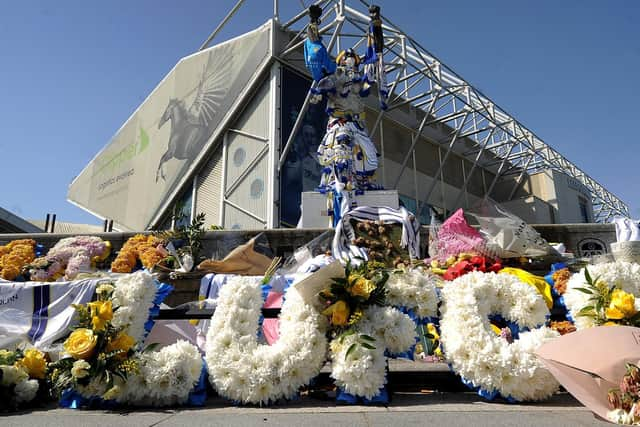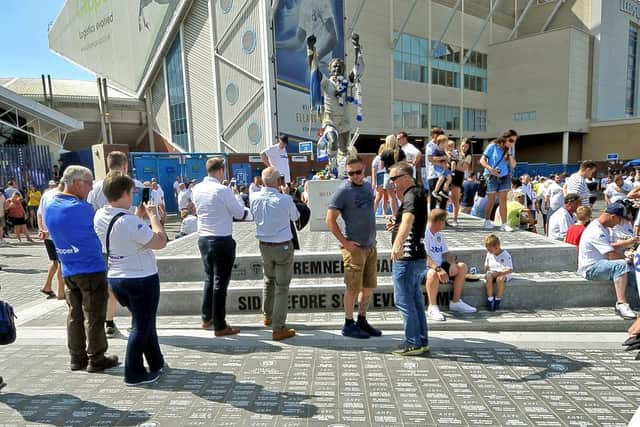For Leeds United fans Saturdays at Elland Road mean more than football matches
and live on Freeview channel 276
Frances Segelman’s statue of Billy Bremner was unveiled in 1999.
The club’s greatest captain, the man whose ‘side before self, every time’ mantra has grown into a philosophy to which the entire club aspires, is in a permanent pose of celebration outside the ground.
Advertisement
Hide AdAdvertisement
Hide AdThe gesture – fists raised in triumph – befits his character and status as a winner, as a man who achieved more for Leeds than any other to wear the armband and lead the Whites onto the pitch.
In 2012, Graham Ibbeson’s bronze figure of Don Revie took its place at Elland Road, 40 years after his team won the FA Cup, just one of the trophies the legendary manager masterminded.
Six years later 10 stones, dedicated to some of the club’s finest and most popular players, were placed around Bremner.
Some of those players are no longer with us.
And last year, as part of the club’s 100th birthday celebrations, the ribbon was cut – by present and former players Gjanni Alioski and Tony Dorigo – on a wall listing the names of every player to represent the Whites.


Advertisement
Hide AdAdvertisement
Hide AdMost recently, the South Stand was named after Norman Hunter, taken by the very illness that has changed all our lives, last month at the age of 76.
Centenary Square, upon which work has had to pause due to the coronavirus pandemic, will host a series of granite benches dedicated to the club’s greatest moments.
Leeds have immortalised and continue to pay permanent tribute to all the men lucky enough and good enough to have worn the white shirt.
But the names and memories of supporters live forever at Elland Road, resting alongside the monuments to the men they idolised.


Advertisement
Hide AdAdvertisement
Hide AdAround Bremner’s statue six thousand individual stones were laid, into which the names of loved ones were carved.
So a matchday trip to LS11 is as much about remembering the collective past and individual, personal memories as it is about watching the Whites’ future unfold.
Graham Hyde of the Leeds United Supporters Trust says the club’s permanent memorials allow fans to reconnect emotionally to what and who has gone before.
“I think it’s a link with the past and a really healthy one,” he said.
Advertisement
Hide AdAdvertisement
Hide Ad“We feel reconnected to the memories that have perhaps brought us here, to the great teams of the past and the history and memories they evoke within us.
“When you think about Bremner Square for example and the players within that, obviously only a top 11 were chosen but the brilliant work they’ve been doing the last few weeks cleaning the stones, it brings to the fore that there are individuals memorialised and written in stone, quite literally.
“It prompts memories.
“It’s tied into fan memories, there are so many who have stones for a lost loved one.
“Football in our own histories – you can remember the first game you went to, the first time a result made you really sad – it’s such an emotional thing.
Advertisement
Hide AdAdvertisement
Hide Ad“Having physical memorials at the club, entities that remind us are a link to the past so we don’t forget.”
Clubs like Leeds, with glorious eras and past successes upon which lasting reputations are built, can often be accused of living in the past and trading on former glories, particularly as their exile from the top flight of English football goes on.
But at the heart of the efforts to pay tribute to men like Hunter, Bremner, Revie, John Charles, Gary Speed or the rank and file of the club’s support, lies the fact that the beautiful game is a highly charged emotional experience for those who love it.
It can provide the highest of highs and the lowest of lows, or simply serve as a distraction from whatever it is that is going on in the lives we lead outside of that blissful or horrific 90-minute window on a Saturday afternoon or Tuesday evening.
And what football does for us, the people whose skill and exertions give us those highs, along with the people we share all the ensuing emotions with, should never be forgotten.